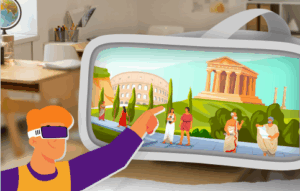The Workshop
The aim of the workshop is to discuss innovative approaches to the sustainable transfer of knowledge about cultural heritage within the school context, making full use of the potential of digital media and digital reproductions. At the heart of the event lies the question: How can cultural heritage sites be designed digitally, interactively, and sustainably in order to reach young people and those with limited access to education? Using examples of heritage sites in various countries, the workshop will examine digitization efforts in terms of achieving social sustainability and develop evidence-based concepts for practical implementation. Guiding questions include: What forms of digital valorization are being generated and are they being made accessible to the public? And are they being used within the context of sustainable knowledge transfer in schools — and if so, to what extent?
The workshop is based on the experiences and initial results of a pilot study, "Transforming Cultural Heritage in 3D", which focuses on the digitization of the Barbara Baths in Trier. High-resolution 3D models were created using a combination of photogrammetry and LiDAR scanning, providing a realistic and detailed representation of the cultural monument.
Sustainable Knowledge Transfer
With the transformation of mass media, the radically different principles of the digital economy, and the rise of AI as a widely used tool of cultural production, the principles and conditions of cultural participation have changed dramatically. The broad democratization of cultural participation has led to a new element of societal democratization. Digital participation thus holds the potential to broaden access to cultural heritage and enable the reinterpretation and dissemination of societal knowledge in new, needs-based digital formats.
At the same time, the use of digital media and AI support has increased drastically among young people. Around 62% of young people use AI daily, particularly for knowledge generation.
This development contrasts with state educational and cultural institutions, which are currently only slowly embracing new digital methods of knowledge and cultural transmission. As a result, the cultivation of young people is largely left to the organizations of the digital economy, and the teaching and learning methods practiced in schools are increasingly drifting away from the everyday experiences of their students. This decoupling dynamic needs to be reduced.
Workshop Program
10:00 Welcome (Markus Pohlmann, MWI)
10:15 Socially Sustainable Digital Teaching and Learning (Petra Deger, PH)
11:00 Socially Sustainable Valorization of Cultural Heritage: Initial Research Findings (Kim Angelina Kettner)
11:45 Socially Sustainable Valorization of Cultural Heritage: Grant Application Perspectives (Leoni Kotwan)
12:30 Lunch Break
13:30 Schools, AI, and Everyday Life – Building Bridges Through Digital Culture (Christina Wietig, Waldparkschule HD)
14:15 Digitization and Social Sustainability in Romania (Romanita Constantinescu, RS)
15:00 Digitization and Social Sustainability in Museums (Friederike Elias, Völkerkundemuseum)
15:45 Results
16:00 End of Event

